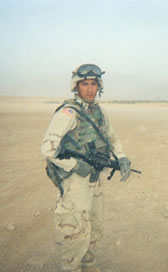Reducing Stigma for American Military Personnel
Teleconference Presentation [PDF Format – 1Mb]
Teleconference Presentation [PowerPoint Format - 2Mb]
Please choose to save the presentation file you select to your computer before opening it. Allow for extra processing time when opening large files.
The original name of this teleconference was “Reducing Stigma for American Soldiers” but it has come to our attention that the word "soldiers" is used primarily to refer to Army personnel. It was our intent that this teleconference would address stigma that all military personnel face, including veterans, reservists, and members of the Army, Navy, Air Force, and Marines—and their families. We apologize for any confusion and hope that military personnel of all branches, along with their families, providers, researchers, and other individuals will join us for this training event.
Training Summary
Nearly 1.4 million men and women make up the existing ranks of active duty military personnel, serving in the Army, Navy, Marine Corps, and Air Force, but research shows that America’s soldiers may not seek help when they are experiencing a mental health problem.
A 2004 study of 6,000 military personnel involved in ground combat operations in Iraq and Afghanistan found that of those whose responses indicated a mental health problem, only 23 to 40 percent sought psychiatric help.1 Many who did not cited fear of being stigmatized as a reason.2 In June of this year, the Department of Defense Task Force on Mental Health acknowledged that “Stigma in the military remains pervasive and often prevents service members from seeking needed care” and made dispelling stigma one of their goals.3
This training will:
- Explore research on soldiers, including veterans, and mental health stigma.
- Offer first-hand accounts from people who have experienced mental health stigma in the military.
- Provide an overview of strategies that may help to promote mental health recovery and reduce stigma among members of the military.
1-2 S.G. Boodman. (November 6, 2007.) The other wounded. The Washington Post, last accessed 11/16/07.
3 Department of Defense Task Force on Mental Health. (2007). An achievable vision: Report of the Department of Defense Task Force on Mental Health. Falls Church, VA: Defense Health Board, last referenced 11/29/07.
Event Speakers
Steve Robinson, ONE Freedom, Inc.
 Steve is a retired non-commissioned officer who served twenty years in the Army. He has held every job from Private to Platoon Sergeant and has also been rated in an Officer slot during his career. Since retiring in October 2001, Steve has become an advocate for veterans. He has been called to testify numerous times before the House and Senate on matters pertaining to Force Health Protection and emerging mental health issues related to this generation of returning war veterans. In his work at ONE Freedom, Steve helps veterans and their families recognize and deal with the complex issues that arise from prolonged, multiple deployments. He helps to break down the stigma of seeking help and teaches individuals and families skills to mitigate the effects of wartime trauma.
Steve is a retired non-commissioned officer who served twenty years in the Army. He has held every job from Private to Platoon Sergeant and has also been rated in an Officer slot during his career. Since retiring in October 2001, Steve has become an advocate for veterans. He has been called to testify numerous times before the House and Senate on matters pertaining to Force Health Protection and emerging mental health issues related to this generation of returning war veterans. In his work at ONE Freedom, Steve helps veterans and their families recognize and deal with the complex issues that arise from prolonged, multiple deployments. He helps to break down the stigma of seeking help and teaches individuals and families skills to mitigate the effects of wartime trauma.
Abel Moreno, Vets4Vets
 Abel Moreno is the Media Outreach and Marketing Coordinator for Vets4Vets, a veterans' peer support organization dedicated to helping Iraq and Afghanistan veterans feel good about themselves and heal from any negative aspects of service and war. Abel served 7 years in the Army’s 82nd Airborne Division 307th Engineer Battalion as an L.E engineer. He served one deployment in Afghanistan and one deployment in Iraq. He supported the 3rd Brigade Combat team along with L.E support with Charlie Company 307th Engineer Battalion. Duties performed were fortification, engineer recon, convoy security and demolitions. Abel received the Combat Action Badge, three Army Commendation medals, and two Army Achievement medals.
Abel Moreno is the Media Outreach and Marketing Coordinator for Vets4Vets, a veterans' peer support organization dedicated to helping Iraq and Afghanistan veterans feel good about themselves and heal from any negative aspects of service and war. Abel served 7 years in the Army’s 82nd Airborne Division 307th Engineer Battalion as an L.E engineer. He served one deployment in Afghanistan and one deployment in Iraq. He supported the 3rd Brigade Combat team along with L.E support with Charlie Company 307th Engineer Battalion. Duties performed were fortification, engineer recon, convoy security and demolitions. Abel received the Combat Action Badge, three Army Commendation medals, and two Army Achievement medals.
Rob Timmins, Iraq and Afghanistan Veterans of America
 Rob Timmins is the Field and Outreach Director for Iraq and Afghanistan Veterans of America (IAVA), America’s first and largest Iraq and Afghanistan veterans group. He was an Infantryman with the 101st Airborne Division for the first year of Operation Iraqi Freedom, where he served in Najaf, and then Mosul. Rob escorted fuel convoys, went on patrol, and raided buildings for weapons caches, and also provided security for UN officials and helped Civil Affairs with reconstruction projects. He is an authority on the war in Iraq and issues affecting troops, military families and veterans. Rob holds a B.A. in Sociology from the College of Staten Island and continues to serve his country as a legal specialist with the Army Reserves.
Rob Timmins is the Field and Outreach Director for Iraq and Afghanistan Veterans of America (IAVA), America’s first and largest Iraq and Afghanistan veterans group. He was an Infantryman with the 101st Airborne Division for the first year of Operation Iraqi Freedom, where he served in Najaf, and then Mosul. Rob escorted fuel convoys, went on patrol, and raided buildings for weapons caches, and also provided security for UN officials and helped Civil Affairs with reconstruction projects. He is an authority on the war in Iraq and issues affecting troops, military families and veterans. Rob holds a B.A. in Sociology from the College of Staten Island and continues to serve his country as a legal specialist with the Army Reserves.